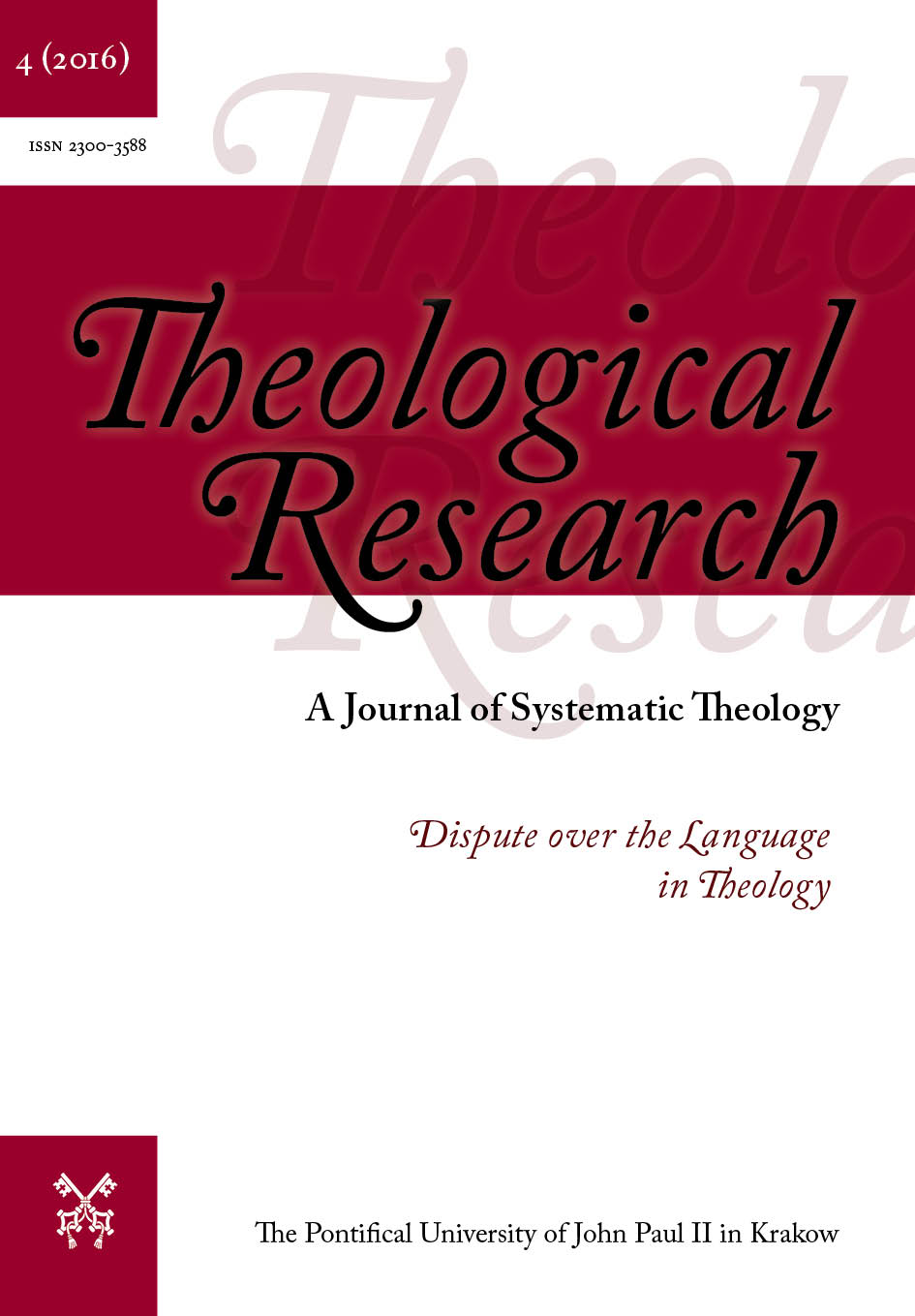Jürgen Habermas on the (Non-)Translatability of Religious Meaning
DOI:
https://doi.org/10.15633/thr.2370Słowa kluczowe:
Habermas, faith and reason, religion in the public sphere, secularism, Frankfurt School, critical theory, communicative action, hermeneutics, theological methodAbstrakt
The relationship between religious faith and public reason has occupied an increasingly central role in Jürgen Habermas’s mature work. Yet this recent engagement with questions of religious meaning also illuminates a significant area of development in Habermas’s thought. While his earlier writings emphasized a need to subordinate religious beliefs to rational critique and to translate religious truth claims into publicly accessible forms of reasoning, his later writings signal a shift to a more cooperative understanding of religious faith and critical reason that highlights the ongoing potential of religion to advance rational discourse and social criticism in the public sphere. This essay traces this growing recognition of the irreducibility of religious meaning in Habermas’s writings, and it attends to the non-translatable dimension of religious faith as a source of its ongoing contemporary significance.Bibliografia
Adams N., Habermas and Theology, New York 2006.
Adorno T., Reason and Revelation, in: E. Mendieta (ed.), The Frankfurt School on Religion: Key Writings by the Major Thinkers, New York 2005, p. 167–175.
Benjamin W., Theses on the Philosophy of History, in: E. Mendieta (ed.), The Frankfurt School on Religion: Key Writings by the Major Thinkers, New York 2005, p. 265–276.
Bloch E., Atheism in Christianity: The Religion of the Exodus and the Kingdom, trans. J. T. Swann, New York 1972.
Britain Ch. C., Adorno and Theology, New York 2010.
Calhoun C., Mendieta E., VanAntwerpen J. (eds.), Habermas and Religion, Malden 2013.
Dillon M., Jürgen Habermas and the Post-Secular Appropriation of Religion: A Sociological Critique, in: P. Gorski et al. (eds.), The Post-Secular in Question: Religion in Contemporary Society, New York 2012, p. 249–278.
Gordon P. E., Adorno and Existence, Cambridge 2016.
Habermas J., The Authority of the Sacred and the Normative Background of Communicative Action, in: J. Habermas, Theory of Communicative Action, vol. 2: Lifeworld and System: A Critique of Functionalist Reason, trans. T. McCarthy, Boston 1987, p. 43–76.
Habermas J., Between Naturalism and Religion, trans. C. Cronin, Malden
Habermas J., Dialectical Idealism in Transition to Materialism: The Philosophical Historical Consequences of Schelling’s Idea about the Contraction of God, in: J. Habermas, Theorie und Praxis, Neuwied 1963.
Habermas J., Faith and Knowledge, in: J. Habermas, The Future of Human Nature, trans. H. Beister, W. Rehg, Malden 2003, p. 101–115.
Habermas J., The Future of Human Nature, trans. H. Beister, W. Rehg, Malden 2003.
Habermas J., Legitimation Crisis, Boston 1975.
Habermas J., Moral Consciousness and Communicative Action, trans. Ch. Lenhardt, Cambridge 2001.
Habermas J., Nachmetaphysisches Denken, Frankfurt am Main 1985.
Habermas J., Notes on a Post-Secular Society, Blätter für deutsche und internationale Politik, April 2008.
Habermas J., “The Political”: The Rational Meaning of a Questionable Inheritance of Political Theology, in: E. Mendieta, J. VanAntwerpen (eds.), The Power of Religion in the Public Sphere, New York 2011, p. 15–33.
Habermas J., Politik, Kunst, Religion: Essays über zeitgenössische Philosophen, Stuttgart 1978.
Habermas J., Postmetaphysical Thinking: Philosophical Essay, trans. W. Mark Hohengarten, Cambridge, MA 1996.
Habermas J., Ratzinger J., Dialectics of Secularization: On Reason and Religion, San Francisco 2006.
Habermas J., Reply to My Critics, in: C. Calhoun, E. Mendieta, J. VanAntwerpen (eds.), Habermas and Religion, Malden 201, p. 348–49.
Habermas J., The Theory of Communicative Action, vol. 1: Reason and the Rationalization of Society, trans. Thomas McCarthy, Boston 1981.
Habermas J., To Seek to Salvage Unconditional Meaning without God is a Futile Undertaking: Reflections on a Remark of Max Horkheimer, in: J. Habermas, Religion and Rationality: Essays on Reason, God, and Modernity, Cambridge 2002, p. 95–109.
Habermas J., Transcendence from Within, Transcendence in this World, in: Don S. Browning, F. Schüssler Fiorenza (eds.), Habermas, Modernity, and Public Theology, New York 1992, p. 67–94.
Habermas J., Zur Rekonstruktion des Historischen Materialismus, Frankfurt am Main 1974.
Junker-Kenny M., Habermas and Theology, New York 2011.
Junker-Kenny M., Religion and Public Reason: A Comparison of the Positions of John Rawls, Jürgen Habermas, and Paul Ricoeur, Berlin 2014.
Lawrence F. G., Transcendence from Within: Benedict XVI and Jürgen Habermas on the Dialogue between Secular Reason and Religious Faith, in: F. G. Lawrence, The Fragility of Consciousness: Faith, Reason, and the Human Good, R. S. Rosenberg, K. M. Vander Schel (eds.), Toronto 2017, p. 193–228.
McLean B. H., Biblical Interpretation and Philosophical Hermeneutics, New York 2012.
Reder M., Schmidt J., Habermas and Religion, in: J. Habermas et al., An Awareness of What is Missing: Faith and Reason in a Post-Secular Age, trans. C. Cronin, Malden 2012, p. 1–14.
Rehg W., Insight and Solidarity: The Discourse Ethics of Jürgen Habermas, Los Angeles 1997.
Wiggerhaus R., The Frankfurt School: Its History, Theories, and Political Significance, Cambridge 1986.
Pobrania
Opublikowane
Numer
Dział
Licencja
Autrzy publikujący w czasopiśmie "Theological Research" zgadzają się na następujące zasady:
a. Autorzy przenoszą na rzecz Uniwersytetu Jana Pawła II w Krakowie (UPJPII) autorskie prawa majątkowe do swoich tekstów.
b. UPJPII udostępnia teksty na platformie wydawniczej, na licencji Creative Commons Uznanie autorstwa-Użycie niekomercyjne-Bez utworów zależnych 3.0 Polska, która umożliwia ich pobieranie i udostępnianie (np. w repozytoriach naukowych), o ile zostaną spełnione warunki:
- podany autor i tytuł tekstu,
- podane miejsce publikacji (tytuł czasopisma i adres internetowy do oryginalnie opublikowanego tekstu),
- tekst będzie dystrybuowany w sposób niekomercyjny.

